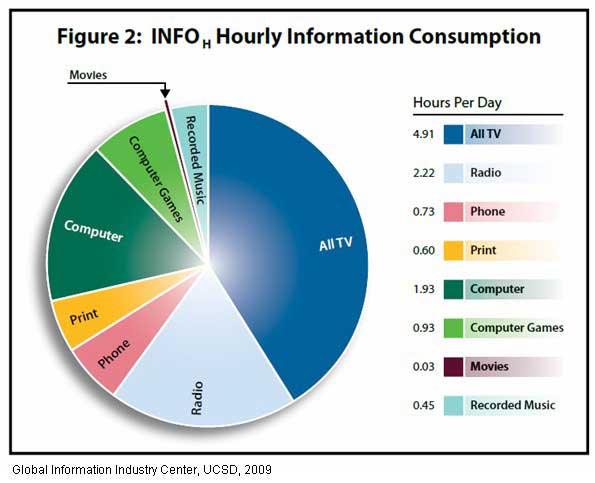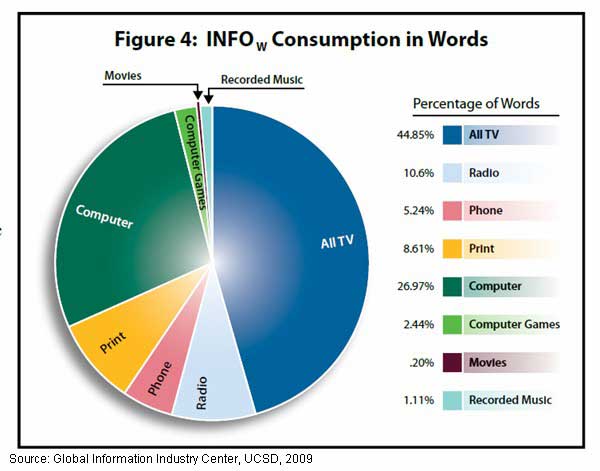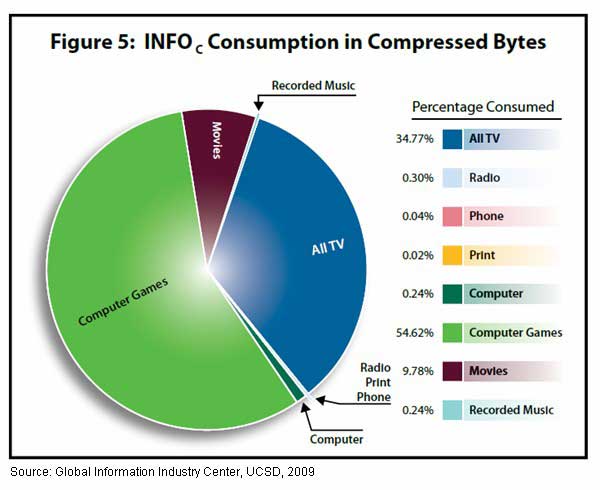Americans consumed 34 gigabytes––and 100,000 words' worth––of information per day in 2008, with traditional media, including radio and television, accounting for 60% of that information, according to research from University of California, San Diego.
Nearly one-quarter of the time spent on consuming information was spent on computers and computer games during the year, the research found.

Below, additional findings from the UCSD study.
Overall, time spent consuming information grew approximately 2.6% annually to 11.8 hours per day in 2008, from 7.4 hours in 1980, due to a combination of population growth and increasing hours per capita.
Across media categories, TV, radio, and computers accounted for most of the time spent consuming information during the year:
- TV( real-time, DVDs, and recorded TV): 41.6% of time, or 4.91 hours (of 11.8)
- Radio: 18.8% of time, or 2.22 hours
- Computer (Internet browsing, playing games, texting, watching video, and working on PC): 16.3% of time, or 1.93 hours
Consumption Measured by Words
Total consumption of words grew to 10,845 trillion in 2008, with TV as the largest source of information, accounting for over 45% of all words consumed, followed by computers (27%).

Interestingly, in 2008 radio accounted for almost 11% Americans' daily information intake in words—but nearly 19% of time spent consuming information. The reason is that much of radio programming is music and has comparatively few words per minute.
Computers have had major effects on some aspects of information consumption. In the past, information consumption was overwhelmingly passive, with the telephone the only interactive medium.
Reading, previously in decline due to the growth of television, tripled from 1980 to 2008, primarily because it is the preferred way to receive words on the Internet. In 2008, one-third of words and more than half of bytes were received interactively.
Looking for real, hard data that can help you match social media tools and tactics to your marketing goals? The State of Social Media Marketing, a 240-page original research report from MarketingProfs, gives you the inside scoop on how 5,140 marketing pros are using social media to create winning campaigns, measure ROI, and reach audiences in new and exciting ways.
Consumption Measured by Bytes
American households consumed a total of 3.6 zettabytes during 2008, where 1 zettabyte is equal to 1 billion trillion bytes, or a 1 with 21 zeros after it.
Put into perspective, one exabyte, which equals 1/1,000 of a zettabyte (or 1 billion gigabytes), is roughly equivalent to the capacity of 5.1 million computer hard drives, or all the hard drives in Minnesota.
When measured by bytes, moving pictures dominate all other types of consumer information—and only three activities contribute a significant amount of information: computer games (55%), television (35%), and movies in theaters (9.8%).
Everything else adds up to less than 1%.

Compared with the 140% increase in total words consumed from 1980 to 2008, there was a 350% increase in the number of bytes consumed, to 3.6 zettabytes. The higher growth of bytes than words reflects faster growth in visual media (TV and computers) than in verbal and textual media (radio and print).
About the data: The How Much Information? 2009 Report on American Consumers study was conducted by the Global Information Industry C enter at the University of California, San Diego. The data includes analyses of more than 20 sources of information, from old media (newspapers and books) to new (portable computer games, satellite radio, and Internet video). Information consumption at work is not included in the findings.



